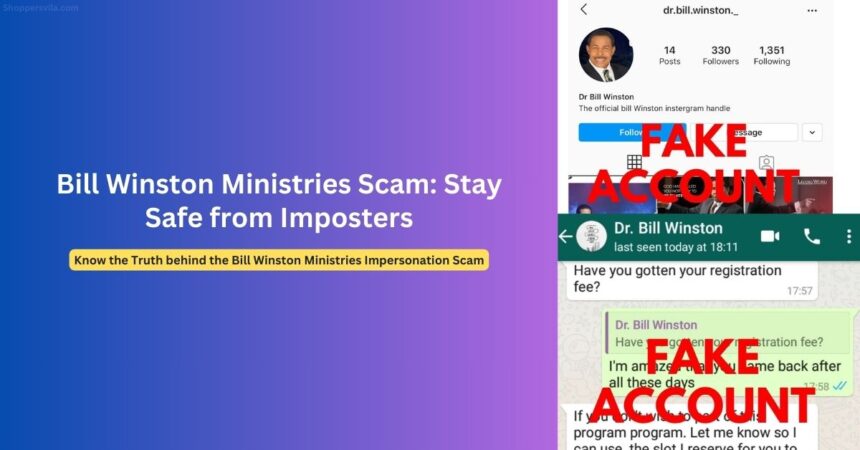In the digital age, religious institutions are not immune to cyber threats and scams. A recent warning from Bill Winston Ministries has shed light on a growing wave of fraudulent activity falsely carried out in the name of faith. This article breaks down the nature of the scam, how it operates, and how followers and supporters can safeguard themselves.
Overview of the Scam Targeting Bill Winston Ministries
Bill Winston Ministries, led by Dr. Bill Winston, is a globally recognized Christian outreach organization known for using social media platforms like Facebook, Instagram, Twitter, and WhatsApp to connect with its audience. However, the ministry has become a target of online scammers impersonating both the ministry and Dr. Winston himself.
Scammers have been creating fake social media accounts and profiles across various platforms. These fraudulent accounts often use official-looking names, logos, and profile photos to appear legitimate. They then reach out to unsuspecting followers, often via direct messages (DMs) or inbox messages, to solicit donations or personal information under false pretenses.
Bill Winston Ministries has made it clear in multiple public statements that they never ask for money through private messages or social media DMs. Despite active measures, including working with platforms like Facebook to report and shut down these fake profiles, the problem persists due to the ease with which new fake accounts can be created.
This scam exploits the trust that supporters have in religious institutions, making it especially dangerous. It is a reminder of the importance of digital literacy and vigilance in an age where cyber fraud is rampant—even in faith-based communities.
How the Scam Works: Tactics Used by Fraudsters
Understanding how the scam operates is critical in identifying and avoiding it. Here’s a breakdown of common tactics used by the fraudsters targeting followers of Bill Winston Ministries:
- Impersonation: Scammers create fake profiles using Bill Winston’s name, image, and branding. These may include fake Facebook pages, Instagram profiles, or WhatsApp accounts.
- Private Messages: Victims are contacted through DMs or inbox messages. The tone is often warm, spiritual, and urgent, designed to create emotional trust quickly.
- False Appeals: The messages may claim that the ministry is raising funds for urgent causes—such as feeding the poor, funding missions, or medical emergencies. They might even promise blessings or miracles in exchange for donations.
- Payment Requests: Once trust is established, the scammer provides payment details—often untraceable methods like cryptocurrency wallets, gift cards, or foreign bank accounts.
- Follow-Up Scams: In some cases, if a victim complies once, the scammer continues the conversation to ask for more money or sensitive information.
These scams prey on the goodwill and faith of supporters. Because they appear to come from a trusted religious figure, many fall victim before realizing they have been deceived.
Red Flags to Watch Out For Bill Winston Ministries’ Fake Social Media Profiles
There are several red flags that can help you identify a scam associated with Bill Winston Ministries or similar organizations. These include:
- Unsolicited Messages: Any message from someone claiming to be Dr. Bill Winston or a representative asking for money should be treated with skepticism.
- Urgency and Pressure: Scammers often use high-pressure tactics or claim that time-sensitive action is needed. Legitimate ministries will not rush or threaten you.
- Requests for Untraceable Payments: Be wary if asked to send money via gift cards, wire transfers, cryptocurrency, or other hard-to-trace methods.
- Grammar and Spelling Errors: Many scam messages contain noticeable language mistakes or awkward phrasing.
- Too Good to Be True Promises: Promises of divine intervention, miracles, or massive blessings in exchange for money are a major red flag.
Bill Winston Ministries has officially stated they will never ask for money via private messages, inboxes, or one-on-one social media interactions. If you encounter such a request, it’s almost certainly a scam.
How to Identify and Protect Yourself from These Scams
Recognizing and protecting yourself from scams requires a proactive approach. Here’s how you can stay safe:
- Verify Accounts: Always check the authenticity of the social media account. Bill Winston Ministries provides a list of its official profiles on its website.
- Report Suspicious Activity: Report fake accounts directly to the social media platform. Most platforms offer a simple process for flagging impersonations.
- Avoid Sharing Personal Info: Never share your personal, financial, or identification details with anyone over social media.
- Contact the Ministry Directly: If you’re unsure whether a message is genuine, contact Bill Winston Ministries through their verified email ([email protected]) or call (708-697-5100).
- Educate Others: Inform friends and family about these scams. The more people know, the harder it becomes for scammers to succeed.
- Use Privacy Settings: Strengthen your privacy settings on social platforms to reduce exposure to unknown contacts.
| Action Item | Why It Matters |
|---|---|
| Verify Accounts | Confirms you’re dealing with a legitimate source |
| Report Fake Profiles | Helps platforms remove harmful content |
| Avoid Personal Sharing | Protects you from identity theft and fraud |
| Contact Directly | Confirms legitimacy of any request |
| Educate Others | Builds a safer community online |
Staying vigilant online is just as important as being vigilant in real life. Trust, but verify.
Frequently Asked Questions (FAQs)
1. Is Bill Winston Ministries being scammed?
Yes, scammers are impersonating the ministry and Dr. Bill Winston to solicit money fraudulently. The ministry itself is not committing fraud—it is the victim of impersonation.
2. How can I tell if a message is really from Bill Winston Ministries?
Only trust messages from their verified social media profiles. They never ask for money via private messages or DMs.
3. What should I do if I sent money to a fake account?
Immediately report the incident to the social media platform, your bank, and also file a complaint with the FBI’s Internet Crime Complaint Center at www.ic3.gov.
4. Why do people fall for these scams?
Scammers exploit trust, urgency, and emotion—especially in religious settings where followers may be more inclined to give out of faith and goodwill.
5. Where can I find the real social media accounts for the ministry?
Official links are published on the Bill Winston Ministries website. They include verified Facebook, Twitter, Instagram, and YouTube pages.
Conclusion: Faith and Caution Must Go Hand in Hand
Scammers will continue to use evolving methods to exploit trust, especially when it involves faith-based organizations like Bill Winston Ministries. This unfortunate reality is a call for believers to balance their faith with digital awareness.
Bill Winston Ministries has acted responsibly by publicly addressing the issue, providing clear guidance, and listing official communication channels. It is now up to the followers to stay informed, spread the word, and protect themselves and others.
Faith can move mountains, but awareness prevents deception. In the age of social media, staying informed is not just wise—it’s essential. If you come across suspicious activity, don’t ignore it. Report it, verify it, and always choose caution over blind trust.
Let’s stand together to stop online scams and protect the integrity of ministries doing genuine, life-changing work.
For official information and updates, always visit www.billwinston.org.





























